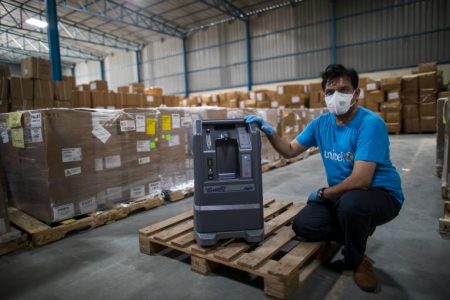UNICEF has sent critical lifesaving supplies, including 3,000 oxygen concentrators, diagnostic tests, medical kits, and other equipment to help India in its battle with a deadly wave of COVID-19.

“COVID-19 is severely overstraining the health system in India,” said Dr. Yasmin Haque, UNICEF Representative in India. “Urgent action is needed to avert further tragic loss of life. UNICEF has provided oxygen supplies and other critically needed emergency equipment for immediate response while supporting resilience building against recurrent shocks and stresses. Indeed, much more is needed as the outbreak continues to spread rapidly.”
Along with the oxygen concentrators, UNICEF has supplied more than 500 high flow nasal cannulas and 85 RT-PCR (COVID testing) machines. Additionally, UNICEF is supporting the procurement and installation of 25 oxygen plants for hospitals in the Northeast and in Maharashtra, and the installation of more than 70 thermal scanners at various ports of entry countrywide.
UNICEF has deployed senior level experts in worst hit states such as Maharashtra, to provide support to state and local authorities for short-term COVID-response planning and monitoring.
“The scenes we are seeing in India are simply devastating,” said George Laryea-Adjei, UNICEF Regional Director for South Asia. “The most vulnerable families are paying a steep price for this deadly new surge. UNICEF calls on all partners who are able to support in responding to this new wave to do so immediately.”
While providing urgent support to the healthcare system, UNICEF has also been assisting the Government of India in ensuring critical services for the most vulnerable children continue functioning.
UNICEF provided more than 11,000 personal protection kits for functionaries working on India’s Childline so that childcare services can continue. Across all states, UNICEF is providing guidance and support for the safety and care of children in childcare institutions.
UNICEF is also providing technical support to the government and partners to help 12.3 million children in 17 states continue learning from home. For example, ‘Mobile learning Centres’ in Bihar are helping 28,000 children who did not have access to any type of digital equipment to continue learning.
UNICEF and partners also continue to support the Government of India in the acceleration of the national vaccine rollout to equitably reach all population groups. Through its work on Risk Communication and Communication Engagement (RCCE) UNICEF has also consistently worked to counter misinformation and promote COVID Appropriate Behaviours (wearing masks, physical distancing, and handwashing), using social media listening and audience insights. New multimedia content is produced weekly in multiple languages for broadcast on digital channels and media, especially at the state level.
UNICEF needs $21 million for the urgent delivery of additional testing equipment, supplies and oxygen products in India, and more than $50 million for lifesaving COVID-19 interventions across sectors.
More info on http://www.donacije.unicef.rs